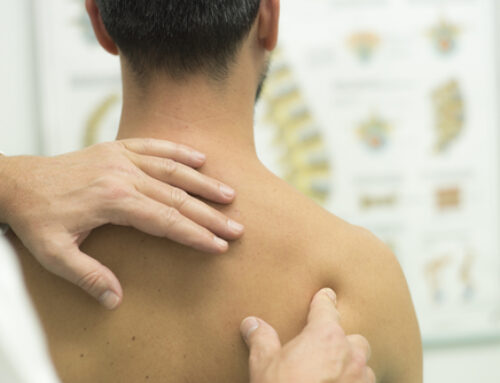What is Shoulder Impingement Syndrome?
The shoulder is possibly the most complex joint in the body. It is formed by three bones; the Scapula (shoulder blade), the Humerus (bone of the upper arm) and Clavicle (collar bone). It is a very flexible ball and socket joint which means it is not as stable as other joints.
Numerous muscles connect and more importantly control the shoulder complex. The most important of these muscles are the Rotator Cuff, which consist of 4 muscles in total. The Rotator Cuff itself is a group of muscles that attach the top of the arm to the shoulder blade. The muscles work together to stabilise the shoulder whilst you move your arm. If the rotator cuff is not working correctly it can affect the way you control your shoulder joint resulting in “Impingement”.

Shoulder impingement is a term used to describe pain in the shoulder usually with movements of arm out to the side or overhead activities. People often report difficulty with tasks such as washing hair, putting on a coat, or sports such as tennis and netball.
Rotator Cuff Pain
Other terms for the condition can be “Rotator Cuff Pain” or “Subacromial Pain Syndrome”. This type of shoulder pain is very common and up to 80% of people will experience it, to some degree, in their lifetime.
The presence of this pain is often not explicitly associated with new damage to the structures of the shoulder. In fact, studies using ultrasound imaging have shown that nearly all (>96%) of asymptomatic (people without any symptoms) subjects have abnormal findings in their shoulder. This clearly illustrates that the presence of damage, or changes, on imaging of the shoulder does not always correlate with any pain you may experience.
This in turn raises the question “why do you have pain?”. This type of pain is usually caused by poor control, reduced strength or overuse of the shoulder. It can happen suddenly, for example overdoing it in the gym or in the garden. It can also have a slow gradual onset usually caused by reduced strength or sustained poor postures.
This overload can cause shoulder structures, such as the Rotator Cuff tendons, to become painful. Occasionally this pain can spread down the arm and up the neck.
What treatments are available?
Physiotherapy is a vital part of recovering from this problem. If this issue is left unaddressed, it may linger for an extended period and even worsen over time. The role of Physiotherapy is to assist with and guide your recovery through the problem.
Initially, in the acutely painful stages, the first steps are to rest the shoulder to allow it to settle in its severity of pain. Soon, rehabilitation can begin, which will consist of personally tailored movements and strengthening in a graded manner.
Eventually, through effective Physiotherapy, you can rebuild a robust, resilient and pain free shoulder, that can do all the tasks you require from it and more.
On occasion, the cause of pain can be structural damage, such as tears to the shoulder tendons. If this is the case, many people have a full recovery with Physiotherapy alone. If, however, recovery is slow or your pain is not improving, an appointment with a Shoulder Specialist may be necessary to discuss other management options.
Usually, these other management options may include a scan, perhaps followed by local steroid injection and on rare occasions Arthroscopic (keyhole) surgery. We’re proud to have close working relationships with the most experienced and competent surgeons in London and, if a referral is made, our recommendation is only ever based upon the quality of care you are likely to receive from the Specialist.
About the Author
Sherief Marzouk is a specialist chartered physiotherapist based at our City of London clinic. He is an experienced physiotherapist with a special interest in shoulder rehabilitation who receives referrals from London’s most experienced shoulder surgeons. He has spent several years embedded in a specialised shoulder and upper limb unit on one of London’s largest teaching hospitals.
Sherief is currently working towards a Masters Degree in Sports Medicine Exercise and Health at University College London to further his treatments and include the latest research in his management of shoulder injuries. Sherief works in tandem with our Clinic Director, Martine Cooper, who is also a resident expert in treating Shoulder injuries.



